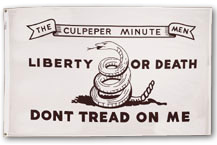This commentary, written in 2003, has been published in various print and online media. Permission is freely granted to reprint or reproduce it, with author credit and link to www.oldenwilde.org.

The tyrant Gessler accuses William Tell
of failing to salute his hat.
Why I Refuse to Recite the Pledge of Allegiance
by Steve Rasmussen (*Diuvei 3°, HP)
Lately I've been catching lots of flak for my "disrespectful" refusal to stand up with everyone else and salute our nation's flag. Sure, the Supreme Court long ago affirmed Americans' right to stay mutely in our seats if we choose. But since 9/11, it's become increasingly de rigueur to recite The Pledge at many public and official meetings, and there seem to be more and more self-appointed witch-hunters in the pews casting an eye about to see who is or isn't participating in the patriotic ritual.
Like many other Constitution-loving Americans who refuse to recite, I could take religious or political offense at the specific words of the Pledge. "One nation, under God"? Even if the Court decides this phrase (inserted in the Pledge during the McCarthy era) doesn't violate separation of church and state, it certainly disregards the Goddesses I have the First-Amendment right to worship as a Pagan. And "liberty and justice for all"? Our government's above-the-law wars on drugs and terror routinely make a mockery of that promise.
But even if they took those words out, I'd still stay seated for the Pledge. I've felt that way ever since I was in elementary school — before I knew anything about politics, before I followed any particular religion. I was around 10 years old when I began my quiet rebellion against a ceremony that struck me, even then, as hypocritical.
The way I saw it, everyone in the classroom was expected to stand up at the same time, face the same direction, hold their hand over their heart the same way, and utter by rote the same words. Where was the "liberty" in that? America, I was taught, is the land of individual freedom, but the Pledge looked and sounded to me, even then, like an exercise in herd-think.
That's the dark side of the Pledge — its conformist effect on group psychology. Every time we all stand up in unison and salute the flag, we are conditioning ourselves to a kind of Pavlovian response that makes it far too easy for our leaders to manipulate us on cue. All they have to do is wave the red-white-and-blue, and most of us will unquestioningly fall in line and follow them into the next disastrous military quagmire, whether in the swamps of Vietnam or the deserts of Iraq. The whole phenomenon reminds me chillingly of those marching ranks of Nazis you see in 1930s newsreels, saluting and pledging obedience to their red-white-and-black swastika flag. Different symbol, same trick.
Don't get me wrong. As a Wiccan, I love a good ritual — as long as it's voluntary — and I do admire our country's beautiful flag, the more so since its five-pointed stars are Pagan in origin (by way of early American Freemasonry). When I visited the Washington Monument on George W. Bush's strife-scarred Inauguration Day, I was deeply moved by a personal rite involving the flag that I saw an elderly man performing there. Wearing his dress military uniform, he stood before each one of the 50 flags that encircle the Monument and solemnly saluted it. On that divisive day, he seemed to be appealing to the Founding Fathers for unity, in a way that was one in spirit with a Tibetan Buddhist's planting prayer flags on a sacred mountaintop.
But it's one thing to pray through a symbol, and quite another to pray to it. Ultimately, a flag is just a pretty scrap of cloth — and to swear an oath of allegiance to it is idolatry in most religions (mine included). How many pious pharisees who demand that the 10 Commandments be posted in every courtroom and schoolroom turn right around in those very same rooms and break the Second Commandment? That's the one that says, "Thou shalt not bow down thyself to ... nor serve ... graven images."
Maybe I'm just a heathen, but I can't see any difference between bowing down and swearing to serve a graven image, and putting your hand to your heart and pledging allegiance to an embroidered one. It's ironic that so many early Christians were martyred for refusing to burn incense or swear loyalty to a statue representing the Roman Emperor, yet so many modern Christians insist on saluting and swearing loyalty to a flag representing the U.S. Government. (I also wonder how many conservative fundamentalists realize that the "time-honored tradition" of the Pledge, as the American Legion recently described it, was invented only in the 1890s by a socialist minister, Francis Bellamy, the cousin of socialist-utopian author Edward Bellamy.)
The current wave of Pledge-piety is part of an insidiously spreading intertwining of religion and politics — "God and Country". Every pickup truck or SUV with a cross or fish on its tailgate nowadays has a flag pasted right next to it. This blurring of the bounds between church and state leads directly to theocratic tyranny — the very thing I thought we were supposed to hate the Taliban and the Ayatollahs for.

To me, a true patriot is one whose allegiance is to freedom, not to flags. Clichés to the contrary, I hope no American soldiers have willingly shed their blood just for some bit of fabric, but rather died believing they were defending the very same Bill of Rights that I, in my own, non-violent way, am putting myself on the line for.
When I sit out the Pledge, isolated and a bit nervous in a disapproving crowd, I'm inspired by people like William Tell. Anyone remember why the Swiss hero was forced to shoot an apple off his son's head? It was because Tell, alone among his fellow townspeople, folded his arms and refused to salute the tyrant's cap that was tacked atop a pole in the public square.
Steve Rasmussen is a Wiccan by religion and a journalist by profession in Asheville, N.C.
Latest update: 30 Jan. 2011





